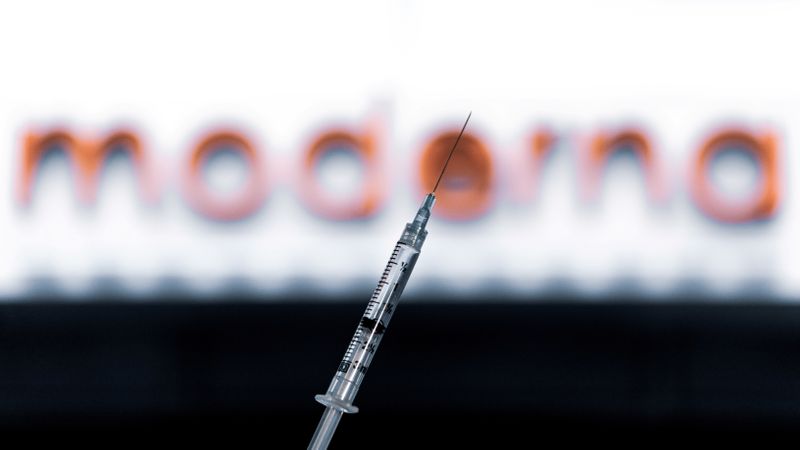By Michael Erman
NEW YORK (Reuters) - U.S. regulators authorized Moderna (NASDAQ:MRNA) Inc's COVID-19 vaccine for emergency use on Friday, a week after granting the first U.S. authorization to Pfizer Inc (NYSE:PFE) and BioNTech SE (NASDAQ:BNTX)'s coronavirus shot.
The following is a comparison of the two vaccines and what to expect as both become available:
HOW ARE THE VACCINES SIMILAR?
Both vaccines use messenger RNA (mRNA) technology, which contains instructions for human cells to make proteins that mimic part of the coronavirus. The instructions spur the immune system into action, turning the body into a virus-zapping vaccine factory. No actual virus is contained in the vaccines.
Both the Pfizer/BioNTech and Moderna vaccines target the crown-like spikes on the surface of the coronavirus that it uses to break into healthy human cells. The spikes also give the family of viruses their distinctive name.
The vaccines appear to be similarly effective. Pfizer and BioNTech's vaccine was around 95% effective at preventing disease symptoms in its late-stage trial, while Moderna's vaccine was around 94% effective.
Both are given in two doses; Pfizer's 21 days apart and Moderna's 28 days apart. Very few participants who received the vaccine in either trial got sick with COVID-19 and almost none got seriously ill.
Data the companies have submitted to the Food and Drug Administration suggest that they start offering partial protection against COVID-19 around two weeks after recipients receive their first dose.
HOW ARE THEY DIFFERENT?
COLD VS ULTRA-COLD
The main difference between the two vaccines is the temperature required to keep them stable long-term.
Pfizer's vaccine must be stored at ultra-cold temperatures of minus 70 degrees Celsius (-94 Fahrenheit). Once thawed, it can only be refrigerated for 5 days. The vaccine requires a special shipping container packed with dry ice to keep it at the proper temperature.
Moderna's vaccine can be stored at standard freezer temperatures of -20 Celsius (-4 Fahrenheit) for up to six months. After it's thawed, it can be kept in a refrigerator for up to 30 days.
SIDE EFFECTS AND SAFETY
Neither of the two large-scale clinical trials of the vaccines turned up any serious long-term side effects. But the vaccines do have slightly different short-term side effect profiles.
While the vaccines have not been compared head-to-head, Moderna's vaccine appears to be associated with slightly more severe cases of fatigue, headache and fever in the day or two following the second shot, especially in people younger than 65.
Although not seen in its clinical trial, Pfizer's vaccine has been linked with a few cases of severe allergic reactions as it has been rolled out in the UK and the United States. At least two healthcare workers in Britain and two in Alaska have reported severe allergic reactions soon after receiving the Pfizer/BioNTech vaccine.
Britain's medical regulator has said anyone with a history of anaphylaxis, or severe allergic reactions to a medicine or food should not get the Pfizer/BioNTech COVID-19 vaccine.
But the U.S. Food and Drug Administration has said it should be safe for most Americans with allergies to receive the vaccine.
WILL MASKS STILL BE NEEDED?
More data is needed to understand exactly how effective either vaccine is at preventing virus transmission. While they are both highly effective at keeping symptoms and severe illness at bay, we do not know if they prevent someone from becoming infected. Until that is known, experts say, masks will still be needed to ensure that vaccinated people do not spread the virus.
WILL AMERICANS GET TO CHOOSE?

At this point, with vaccines in short supply, few people will have the luxury of expressing a preference of which they receive. The U.S. Centers for Disease Control and Prevention has recommended that the first doses be given to healthcare workers and residents in long-term care facilities and most states plan to do that.